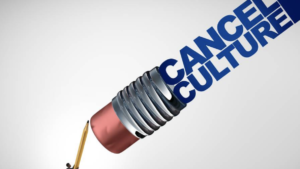Home » Commentary » Opinion » Beware the sinister dangers of cancel culture
· Canberra Times
 First they came for the cheese. Last month, Canadian company Saputo agreed to change the name of its Coon brand of cheese. Indigenous rights activist Stephen Hagan quickly claimed victory in his long-running battle against the food brand.
First they came for the cheese. Last month, Canadian company Saputo agreed to change the name of its Coon brand of cheese. Indigenous rights activist Stephen Hagan quickly claimed victory in his long-running battle against the food brand.
Even though the cheese – named after American cheese maker Edward William Coon, who patented the ripening process involved in its manufacture in 1926 – had been on sale in Australia since 1935, Hagan insisted the name had racist connotations. So now it’s gone.
Next they came for the milk. Hagan was soon eyeing another target in his campaign to eradicate racist labelling used by the Australian milk processing industry. This time it was Pauls diary company and its bottled milk, haplessly branded as Smarter White Milk. According to Hagan, the name implied white people were smarter than black people. But then Hagan relented and decided to let Pauls have its way with the ”racist milk”. Who knows what part of the dairy shelf could be next.
Activist campaigns inveighing against Aussie ”racist dairy” brands are, at one level, comical. But at another level, they pose a serious threat because they are part of a phenomenon sweeping the English-speaking world that’s come to be known as ”cancel culture”.
”Cancelling” is the practice of demanding sanctions against a person, product, image, or institution alleged to cause emotional harm to vulnerable people – even if those things were said or done long ago by people who actually thought they were doing good at the time.
Hence, statues of Captain James Cook were vandalised recently because his critics say the explorer – who charted Australia’s eastern seaboard in the late 18th century – endorsed slavery, invasion, and colonialism. Will James Cook University be next to change its name?
And the stigma of colonialism is what’s also taken the fizz out of Western Australia’s Colonial Brewery, which was condemned for its name – which the company is under mounting pressure to change.
However, once we’ve stopped chuckling about the silliness of ”cancel culture”, we do need to take it much more seriously. That’s because it uses ideology to cleanse elements of Australian history it doesn’t like – and denies the record of those who helped build this country.
For one thing, the impulse behind cancel culture to erase our heritage and impose a revised interpretation of the past will only undermine rigorous, informed historical inquiry. But it goes further than that and actually poses three pressing dangers.
First, by intentionally promoting divisive and incorrect ideas about our history – such as that the nation was built on slavery and genocide – cancel culture threatens not only to undermine our sense of national identity but also to corrode the civility that binds our country. Corroding civility leads to the second danger: the destruction of trust. Despite deliberate attempts to divide us by stoking fears about racism, we know Australia remains one of the world’s most successful multicultural societies – to which many people want to migrate, because they can depend on the community bonds of trust behind that success.
And once trust is destroyed, the third danger posed by cancel culture confronts us: the danger that the fires of discord will be stoked and reasoned debate will perish. For once guardians of the ”new” orthodoxy police all expressions of opinion, freedoms of speech and association will quickly disappear.
Of course, fighting racism, violence, and slavery is important. And in an open society, complex problems do need to be debated – even when consensus is elusive.
But when contrary opinions – even when wrong – cannot be canvassed, error cannot be corrected. Many who have signed up to cancel culture sincerely believe in the goals being pursued. But fear of being condemned, humiliated, or forced from a job for saying ”the wrong thing” or stepping out of line means many others will cave in to pressure and remain silent.
No nation, including Australia, can claim its history is unsullied by past cruelty and misuse of power. The challenge is to come to terms with our history rather than simply pretend it does not exist and try to cleanse it by ”cancelling” what is condemned as offensive.
We can smile about what’s written on a bottle of milk. But we must not ignore the three more sinister dangers posed by cancel culture. For once we have allowed cancel culture to debase all we stand for, ”truth” will then be determined solely by the tyrants of cleansing.
Beware the sinister dangers of cancel culture